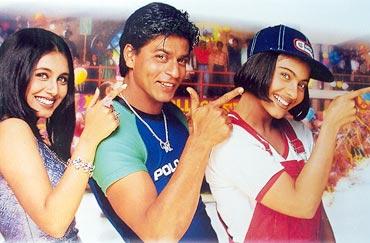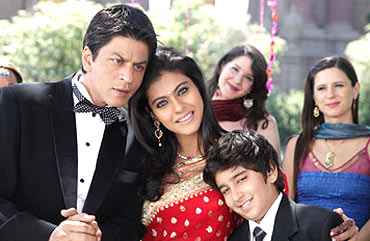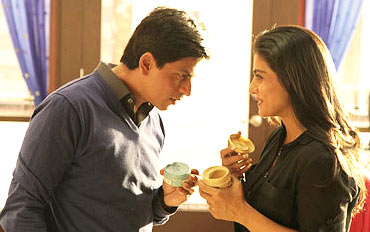Vanita Kohli-Khandekar in Mumbai
Karan Johar is within his rights to preen. His latest (and fourth) film as a director, My Name is Khan (MNIK), has already grossed $22 million (Rs 100 crore) at the Indian box office and is expected to do the same in the overseas market.
More importantly, MNIK is not an NRI film, a tag that has stuck to Johar ever since his first film Kuch Kuch Hota Hai.
His penchant for rich families, houses in New York or London and loads of rituals and drama has made other directors spoof him. MNIK was released not just in NRI pockets but in 45 countries across the world by News Corporation subsidiary Fox Searchlight.
The film, a story of tolerance and love, talks to a global audience, not just Indians. That Johar, 37, got Fox interested enough to pay Rs 85 crore for the film shows that he has a nose for both the audience and the business.
This was evident at FICCI Frames 2010, held in Mumbai, earlier this month. While chatting with co-speakers before a panel discussion, Johar discovered to his shock that he was not moderating but speaking on "Do film reviews matter?"
Yet, minutes later, without saying anything new, he had the audience eating out of his hand. This man lives by his wits, of which he has plenty. Vanita Kohli-Khandekar caught up with Johar over a long car ride in Mumbai. Excerpts:
'Success and acclaim kill your instinct'
Image: A scene from Kuch Kuch Hota HaiYou were 25 when you made Kuch Kuch Hota Hai -- how do you think you have changed as a filmmaker?
What I have gained are perspective, an understanding of technology and huge amounts of confidence. What I have lost are innocence, instinct and rawness.
During the making of Kuch Kuch Hota Hai, I was like a lost child. Many of the great moments in the film, the ones that were appreciated the most, were based either on my instinct or were happy accidents. At that time, all I wanted was to make a film and have a release.
In Kabhie Khushi Kabhie Gham, my second film, I was immediately more confident. Success and acclaim change your thought process. It kills your instinct. Today, if I just wanted to make a film for fun, I would have lots of thoughts about where it would work, who the audience are and so on.
You come across as irreverent, but your company has done very well...
The irreverence is my personality. I have a casual approach to people. I am a ridiculous businessman. What I have is the intuition to pick up the right people and give them responsibility. Left to myself, I always want to spend more than I should. I need to be constantly policed by my CA and staff.
My sensibilities (as a film maker) wouldn't go beyond A-Class towns -- I can never make a film like Ghajini. Maybe, I am not a film maker who can tap a certain kind of audience. For instance, I can never do a film on poverty. But I am not an NRI film maker, which is what a lot of people call me.
What they don't realise is that there is no single NRI market -- there is the US market which has young professionals. There is the UK market which has people who left in the 60s, and are conservative.
'I don't think I did a lot of things with a lot of thought'
Image: Kajol, Karan Johar, Rani Mukerji and Shah Rukh Khan on Coffee With KaranYou have hosted a successful TV show and invested in a TV company (NDTV Lumiere). What was the thought behind these?
Hosting the TV show was my hobby, I did it like one. Because of my knowing them (the stars) the way I do, there was casualness, an ease to the conversation which audiences enjoyed. There was something voyeuristic about it. The audience had a sense that they were watching a conversation between friends. Later, I realised what it (the show) would do to my brand value.
I have sold my share in Lumiere to Turner (which recently bought a majority stake in the holding company).
None of these things were done with the intention of making money. In fact, I don't think I did a lot of things with a lot of thought. Dharma (the production firm Johar owns) is a strange place. It is not a studio, nor is it a large production house. We still haven't tied up with anyone.
What was the Fox experience like?
It was tough because it was a clash of cultures and we (Jim and I) had to adapt to it. Previously, I was used to being my own master. But here was an international company that worked by the book. So, I could be pulled up for things like "why haven't you sent this" or not meeting a deadline for paperwork. When Jim (Gianopoluos, co-chairman, Fox Filmed Entertainment) and I started, we agreed to kill our egos.
Because everything that is part of the modality for them is invasion of space for us. For instance, when a lawyer sits and watches the film, because it is going to be distributed across 45 countries and you don't want to be sued, it is fine. But then she sees it 12 times and sends e-mails and asks for a lot of paperwork, that is tiresome. But it is required.
'My professional relationship with SRK is based on our friendship'
Image: A scene from My Name is KhanThe Indian industry is relationship-oriented, while LA is very process-oriented, so how did you manage?
I told Jim three years ago that we were driven completely by relationships. That we can't put it in Shah Rukh's contract that he will give 72 hours or whatever to promote the film. The fact is that without that contract, Shah Rukh will give 100 or more hours, because he believes in the film. But I cannot demand such a clause from him.
But you just said that the modalities are important...
They are, but there are a few exceptions. On all other aspects, in terms of deliverables like when the print is to be delivered, dubbing, subtitling, etc etc, I will agree with them. But don't ask me to do this with certain people. For instance, I touch Amitabh uncle's feet, so I can't tell him you have to do this and that. So, there are two parallel ways even now.
If I were to launch a new actor today, I would bind him with a tough contract. But in this case (Shah Rukh's), my professional relationship is based on our friendship. I am in this business because of this man.
'I would happily pay Rs 1 crore for an outstanding screenplay'
Image: A scene from My Name is KhanWhat are the other differences in the way we work versus how things work in Hollywood?
Someone fixed a meeting between Shah Rukh and I, and Martin Scorsese and Leonardo DiCaprio while we were doing My Name is Khan. We were chatting and Leonardo was shocked to know that Shah Rukh and I speak to each other directly and not through a publicist or an agent.
There, they put these things in the contract. Here, if I want to do a costume fitting, I just call Shah Rukh's wife and ask when he will be free. Then I land up at his home with the designer at that time. That is not done there.
What are the big issues this business faces?
We really need to tackle content. We don't have good writers, and to get them, we have to empower them. That means we have to pay more. I would happily pay Rs 1 crore for an outstanding screenplay. I read 50 scripts every two months, nobody is writing anything of consequence.
The second issue is that of actor and technician delusion (on prices). They don't look at the box office revenues of their films. Some of the biggest stars, like Aamir and Shah Rukh, don't delude themselves.
The third issue is this feeling of being a complete fraternity, which is not there. As an industry, we are in a potentially powerful situation to be a global force. I hope we don't mess it up.







Comment
article